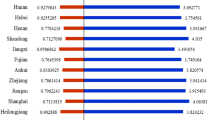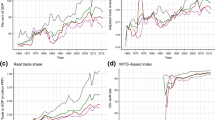Abstract
Despite the vast literature on the various determinants of happiness, very little is known about how financial and trade openness may affect people’s happiness in the current literature. In this paper we attempt to fill in this blank using a large survey data from China. We find that while income inequality indeed has a significantly negative effect on happiness, there also exists a notable happiness-enhancing effect of openness via the inequality channel. Further analysis reveals that even after taking into account the possible happiness loss associated with openness, the net effect of openness on happiness remains positive in most cases. The results of the paper extend the previous literature by highlighting the important effects of financial and trade openness in improving people’s happiness and how these effects may interact with income inequality. From a policy perspective, the results of the paper suggest that increasing openness of the economy would be an important strategy that policymakers could use to improve people’s happiness, especially in the context of rising inequality in most developing and developed countries.
Similar content being viewed by others
References
Alderson, A.S., Nielsen, F.: Income inequality, development, and dependence: a reconsideration. Am. Sociol. Rev. 64(4), 606–631 (1999)
Bartolini, S., Sarracino, F.: The dark side of Chinese growth: declining social capital and well-being in times of economic boom. World Dev. 74(6), 333–351 (2015)
Bjørnskov, C., Dreher, A., Fischer, J.: The bigger the better? Evidence of the Effect of Government Size on Life Satisfaction around the World. Public Choice. 130(3/4), 267–292 (2007)
Blanchflower, D.G., Oswald, A.J.: Is well-being U-shaped over the life cycle? Soc. Sci. Med. 66(8), 1733–1749 (2008)
Brockmann, H., Delhey, J., Welzel, C., Yuan, H.: The China puzzle: falling happiness in a rising economy. J. Happiness Stud. 10(4), 387–405 (2009)
Chang, R., Kaltani, L., Loayza, N.V.: Openness can be good for growth: the role of policy complementarities. J. Dev. Econ. 90(1), 33–49 (2009)
Chang, W.C.: Climbing up the social ladders: identity, relative income, and subjective well-being. Soc. Indic. Res. 113(1), 513–535 (2013)
Chinn, M.D., Ito, H.: What matters for financial development? Capital controls, institutions, and interactions. J. Dev. Econ. 81(1), 163–192 (2006)
Di Tella, R., MacCulloch, R.: Gross national happiness as an answer to the Easterlin paradox? J. Dev. Econ. 86, 22–42 (2008)
DiPrete, T.A., Forristal, J.D.: Multi-level models: methods and substance. Annu. Rev. Sociol. 20, 331–357 (1994)
Easterlin, R.A.: Does economic growth improve the human lot? Some empirical evidence. Nations Households Econ. Growth. 89, 89–125 (1974)
Easterlin, R.A.: Will raising the incomes of all increase the happiness of all? J. Econ. Behav. Organ. 27(1), 35–47 (1995)
Easterlin, R.A.: Income and happiness: towards a unified theory. Econ. J. 111(473), 465–484 (2001)
Easterlin, R.A., Morgan, R., Switek, M., Wang, F.: China’s life satisfaction, 1990-2010. Proc. Natl. Acad. Sci. U. S. A. 109(25), 9775–9780 (2012)
Easterlin, R.A., Wang, F., Wang, S.: Growth and happiness in China, 1990–2015. In: Helliwell, J.F., Layard, R., Sachs, J. (eds.) World Happiness Report 2017, vol. 3, pp. 48–83. Sustainable Development Solutions Network, New York (2017)
Edwards, S.: Openness, productivity and growth: what do we really know? Econ. J. 108(447), 383–398 (1998)
Esping-Andersen, G., Nedoluzhko, L.: Inequality equilibria and individual well-being. Soc. Sci. Res. 62, 24–28 (2017)
Ferrer-I-Carbonell, A., Frijters, P.: How important is methodology for the estimates of the determinants of happiness? Econ. J. 114(497), 641–659 (2004)
Graafland, J., Compen, B.: Economic freedom and life satisfaction: mediation by income per capita and generalized trust. J. Happiness Stud. 16(3), 789–810 (2015)
Graafland, J., Lous, B.: Economic freedom, income inequality and life satisfaction in OECD countries. J. Happiness Stud. 19(7), 2071–2093 (2018)
Graham, C., Felton, A.: Inequality and happiness: insights from Latin America. J. Econ. Inequal. 4(1), 107–122 (2006)
Graham, C., Zhou, S., Zhang, J.: Happiness and health in China: the paradox of progress. World Dev. 96, 231–244 (2017)
Guriev, S., Zhuravskaya, E.: (Un)Happiness in transition. J. Econ. Perspect. 23(2), 143–168 (2009)
Gwartney, J.D., Lawson, R.A., Holcombe, R.G.: Economic freedom and the environment for economic growth. J. Inst. Theor. Econ. 155(4), 643–643 (1999)
Hao, Y.: Structural social capital, household income and life satisfaction: the evidence from Beijing, Shanghai and Guangdong-province, China. J. Happiness Stud. 17(2), 569–586 (2016)
Helliwell, J.F., Huang, H.: How’s your government? International evidence linking good government and well-being. British J. Political Sci. 38(4), 595–619 (2008)
Huang, J., Wu, S., Deng, S.: Relative income, relative assets, and happiness in urban China. Soc. Indic. Res. 126(3), 971–985 (2016)
Jiang, S., Lu, M., Sato, H.: Identity, inequality, and happiness: evidence from urban China. World Dev. 40(6), 1190–1200 (2012)
Kelley, J., Evans, M.D.R.: Societal income inequality and individual subjective well-being: results from 68 societies and over 200, 000 individuals, 1981-2008. Soc. Sci. Res. 62, 1–23 (2016)
Knight, J., Gunatilaka, R.: Great expectations? The subjective well-being of rural-urban migrants in China. World Develop. 38(1), 113–124 (2010)
Knight, J., Song, L., Gunatilaka, R.: Subjective well-being and its determinants in rural China. China Econ. Rev. 20(4), 635–649 (2009)
Lane, P.R., Milesi-Ferretti, G.M.: The external wealth of nations mark II: revised and extended estimates of foreign assets and liabilities, 1970-2004. J. Int. Econ. 73(2), 223–250 (2007)
Lane, T.: How does happiness relate to economic behavior? A review of the literature. J. Behavior. Exp. Econ. 68, 62–78 (2017)
Lee, J.E.: Inequality and globalization in Europe. J. Policy Model. 28(7), 791–796 (2006)
Lee, W.S., Zhao, Z.: Height, weight and well-being for rural, urban and migrant workers in China. Soc. Indic. Res. 2015, 1–20 (2015)
Lei, X., Shen, Y., Smith, J.P., Zhou, G.: Life satisfaction in China and consumption and income inequalities. Rev. Econ. Househ. 16(11), 1–21 (2018)
Liang, Y., Shen, J.: Subjective well-being and its determinants in China: an empirical study based on survey data. Res. Appl. Econ. 8(3), 1–18 (2016)
Nikolaev, B., Mcgee, J.: Relative verbal intelligence and happiness. Intelligence. 59, 1–7 (2016)
Oshio, T., Kobayashi, M.: Area-level income inequality and individual happiness: evidence from Japan. J. Happiness Stud. 12(4), 633–649 (2011)
Ovaska, T., Takashima, R.: Economic policy and the level of self-perceived well-being: an international comparison. J. Socio-Econ. 35(2), 308–325 (2006)
Panagariya, A.: Preferential trade liberalization: the traditional theory and new developments. J. Econ. Lit. 38(2), 287–331 (2000)
Piketty, T., Yang, L., Zucman, G.: Capital accumulation, private property and rising inequality in China, 1978-2015. Am. Econ. Rev. 109(7), 2469–2496 (2019)
Scully, G.W.: Economic freedom, government policy and the trade-off between equity and economic growth. Public Choice. 113, 77–96 (2002)
Stets, J.E., Trettevik, R.: Happiness and identities. Soc. Sci. Res. 58, 1–13 (2016)
Tsai, M.C.: Market openness, transition economies and subjective wellbeing. J. Happiness Stud. 10(5), 523–539 (2009)
Veenhoven, R.: Freedom and happiness: a comparative study in 44 nations in the early 1990s. In: Diener, E., Suh, E.M. (eds.) Culture and Subjective Wellbeing, Vol. 10, Pp. 257–288. MIT, Cambridge (2000)
Wang, P., Pan, J., Luo, Z.: The impact of income inequality on individual happiness: evidence from China. Soc. Indic. Res. 121(2), 413–435 (2015)
Wood, A.: Openness and wage inequality in developing countries: the Latin American challenge to east Asian conventional wisdom. World Bank Econ. Rev. 11(1), 33–57 (1997)
Wood, A.: Globalization and wage inequalities: a synthesis of three theories. Rev. World Econ. 138(1), 54–82 (2002)
Wu, Y., Zhu, J.: When are people unhappy? Corruption experience, environment, and life satisfaction in mainland China. J. Happiness Stud. 17(3), 1125–1147 (2016)
Xu, B.: Trade liberalization, wage inequality, and endogenously determined nontraded goods. J. Int. Econ. 60(2), 417–431 (2003)
Yue, X., Li, S., Gao, X.: How large is income inequality in China: assessment on different estimates of Gini coefficient. China Econ. J. 6(2), 113–122 (2013)
Zagorski, K., Evans, M.D.R., Kelley, J., Piotrowska, K.: Does National Income Inequality Affect Individuals’ quality of life in Europe? Inequality, happiness, finances, and health. Soc. Indic. Res. 117(3), 1089–1110 (2014)
Zhang, C., Zhu, Y., Lu, Z.: Trade openness, financial openness, and financial development in China. J. Int. Money Financ. 59(9), 287–309 (2015)
Author information
Authors and Affiliations
Corresponding author
Additional information
Publisher’s Note
Springer Nature remains neutral with regard to jurisdictional claims in published maps and institutional affiliations.
Supplementary Information
ESM 1
(DOC 166 kb)
Rights and permissions
About this article
Cite this article
Ma, Y., Chen, D. Openness, Income Inequality, and Happiness: Evidence from China. J Econ Inequal 20, 371–393 (2022). https://doi.org/10.1007/s10888-021-09507-5
Received:
Accepted:
Published:
Issue Date:
DOI: https://doi.org/10.1007/s10888-021-09507-5




